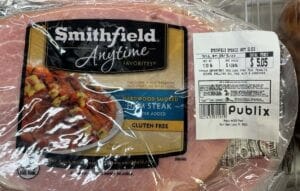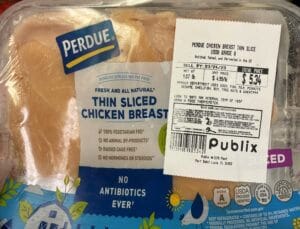
Meredith Smith was surprised to find allergen warning labels on fresh meat and seafood recently at Publix supermarkets in Florida. The cross-contact risk warnings on pricing labels read: “Our department uses eggs, fish, milk, peanuts, sesame, shellfish, soy, tree nuts and wheat.”
Smith saw the labels on meat that Publix employees packaged. They also turned up on meat packaged by other suppliers, which presumably staff would not have handled as raw food. Smith, whose 16-year-old daughter Kendall is allergic to peanuts, left the store empty-handed.
“I take every label, I mean every single label, very seriously,” says Smith. She and Kendall regularly travel between Rochester, New York, and the east coast of Florida for her daughter’s tennis training. Smith had been buying Publix’s and other suppliers’ fresh poultry, meat and seafood at her local Publix during a Florida stay between September 2022 and January 2023.
But when they returned in mid-March, she noticed the cross-contact statement on labels. According to Smith, store managers and a Publix customer service representative could not provide clear information about why the warnings.
It is not clear if the cross-contact statements on meat, poultry and seafood are a new Publix company-wide policy. (One customer representative told Smith that it was, but a store manager was unaware of such a change.)
Publix did not respond to Allergic Living’s requests for clarification on why the widespread warnings. Nor is it clear whether meats from other suppliers are somehow at risk of exposure to the top 9 allergens. [Editor’s note: See our May 2023 article: Publix is promising to change its policy on these warnings.]
It is concerning that Publix is putting allergy advisories on products packaged by another company, says food safety consultant Dr. Steven Gendel. The former expert in the FDA’s Center for Food Safety and Applied Nutrition says that’s especially the case since those products have their own labeling.
Is It OK to Label Over a Brand’s Label?

“It seems counterproductive in terms of communication with consumers,” Gendel says. “It’s going to create a tremendous amount of confusion.”
It certainly has left Smith in the dark. Since she does not know if the food is safe for her daughter, she now buys meat from other stores. Publix has a large presence in the Southeast United States, with over 1,300 stores, most of which are in Florida.
Jen Jobrack, founder of Food Allergy Pros LLC, agrees that with allergen cross-contact concerns, you have to take allergen statements seriously. “If I saw that notice and I didn’t have additional information, I wouldn’t buy that product,” says the food allergy policy expert.
Regardless of why Publix is affixing allergen warnings on fresh meat, it begs the question: Is this allowed? The short answer is yes, which Jobrack explains.
The Food Allergen Labeling and Consumer Protection Act (FALCPA) requires the top 9 major allergens to be clearly labeled on packaged foods. But FALCPA does not cover fresh meat, nor does the FDA regulate advisory labels regarding potential cross-contact.
The USDA regulates fresh meat and poultry products. But like the FDA, it doesn’t offer industry guidance on “may contain” advisory labels. Jobrack says these types of allergen statements are at the discretion of the company.
“It’s not illegal because there is no framework for it. This type of label is not required, nor is it illegal [to apply],” she says.
Gendel agrees the use of advisory labels is voluntary. However, he notes the regulatory agencies say such warnings should not be used as a substitute for safe manufacturing processes.
Allergen Labeling Frustration
Allergic Living reached out to Perdue, one of the brands sold at Publix, to find out if the pricing label is consistent with the Perdue chicken products.
“The label shown on fresh Perdue chicken products at Publix are applied by Publix, not Perdue,” says Jody Hallman, senior director of marketing at Perdue Farms. “Perdue products sold in Publix fresh meat case would not contain the extent of allergens listed on this label.”
Hallman says the only top 9 allergen used in a Perdue fresh chicken facility is milk, which is only used for one product that is not a weighed item.

After seeing the warning on Perdue chicken at her store, Smith recently confirmed the brand is still safe for her child. But she is confused about why Publix would add a label with different information. Because of this, she will purchase Perdue and other brands of meat at other stores. “Publix should want to provide me with the truth about what is safe,” Smith says.
Labels with allergen statements are meant to inform and protect consumers. But Smith feels those pricing labels are not offering protection, just frustration.
What Should Allergy Shoppers Do?
Gendel told Allergic Living that consumers should assume that Publix is warning customers that it doesn’t think those products are safe for people avoiding cross-contact with top allergens.
He would shop elsewhere as “it’s too much of a risk to assume the label doesn’t mean anything.”
Smith agrees but is concerned that employees at her local Publix stores were not aware of the labels or whether there was cross-contact risk.
She notes that the Publix deli counters have a cross-contact warning for all of the products there. So, she has always avoided products that are made in or sliced in the deli area. She respects that some departments, such as the store deli and bakery, need the cross-contact warning.
But the allergy warnings on fresh meat, including that of other suppliers, seem like a blanket label.
“It’s not acceptable to me to say, ‘this is just a department label’. It doesn’t mean anything,” Smith says. “The label should be accurate. And ‘over-labeling’ any product limits people’s access to food that is actually safe for them.”
Gendel says Publix’s allergen labels on fresh meat are not consistent with the aims of the most recent FDA Food Code. “It certainly is not something that would have been encouraged under the FDA Food Code.”
The FDA’s Food Code was updated in December 2022. Aiming for greater transparency, it calls for allergen labeling for “unpackaged foods,” such as those served at delis, supermarket bakeries and restaurants.
But adopting a new Food Code version is recommended, not required. Publix is headquartered in Florida, which follows the 2013 Food Code. That version does not include allergen labeling for unpackaged foods.
Related Reading:
FDA Food Code Calls for Allergen Labeling for Dining, Delis, Bakeries
Bread Suppliers ‘Adding Sesame’ as Seed Becomes Top Allergen
USDA vs. FDA Food Labeling
How to Read a Label When You Have Food Allergies





